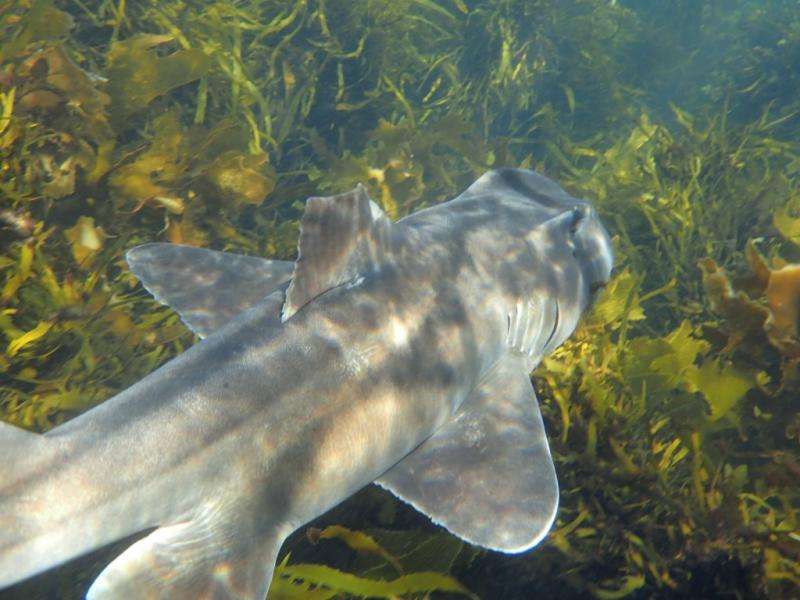Some sharks react more to stress, with potential impacts for humans

Macquarie University researchers have discovered that some Port Jackson sharks have a greater reaction to stressful situations due to a feature of their brain; a discovery with important implications for when wild sharks come into contact with humans.
The study, published in Behavioural Brain Research, firstly looked at whether Port Jackson sharks had lateralised brains – a brain which works more like a dual processor in a computer by performing different tasks in each half. It then went on to see whether the extent of each shark's brain lateralisation had any effect on their response to a stressful situation.
"We found that the strength of laterality in individuals sharks was linked to the manner they responded to stress; in this case being captured and exposed to air for a brief period," said lead author Evan Byrnes, from Associate Professor Brown's laboratory.
In the human brain there are two hemispheres, each specialising in analysing particular sorts of information. The left hemisphere tends to be more analytical and the right hemisphere tends to more creative. People vary in how strongly lateralised their brains are and this is reflected in their behavior.
Laterality has also been linked to a number of emotions including fear and aggression in humans and other animals. Baboons, for example, are more likely to attack individuals that approach from the left. The researchers discovered that within the Port Jackson shark species, some individuals had more lateralised brains while others did not.
"In this study, we found that Port Jackson sharks ranged from being strongly right lateralised to left lateralised and everything in between, very similar to the pattern we have seen in humans and other animals," said Associate Professor Culum Brown, laboratory head from the Department of Biological Sciences at Macquarie University.
The results have implications for fishermen and seafarers, says Catarina Vila Pouca, who is studying Port Jackson shark behavior for of her PhD in Associate Professor Brown's laboratory.
"These experiments suggest that individual sharks will vary in how they respond to being caught, with lateralised individuals being more reactive to handling stress, which has important implications for wild sharks when they come into contact with humans."
The results are another piece of a large evolutionary puzzle about how animal brains have evolved, with the researchers positing that an increased stress response could help lateralised sharks escape from predators more quickly than their weakly lateralised counterparts.
"The study provides the first evidence for brain lateralisation in sharks and indicates ancient evolutionary roots of brain lateralization 240 – 450 million years old, demonstrating another link between lateralisation and a behavioural trait in an animal," Byrnes concluded.
More information: Evan E. Byrnes et al. Laterality strength is linked to stress reactivity in Port Jackson sharks (Heterodontus portusjacksoni), Behavioural Brain Research (2016). DOI: 10.1016/j.bbr.2016.02.033
Journal information: Behavioural Brain Research
Provided by Macquarie University




















